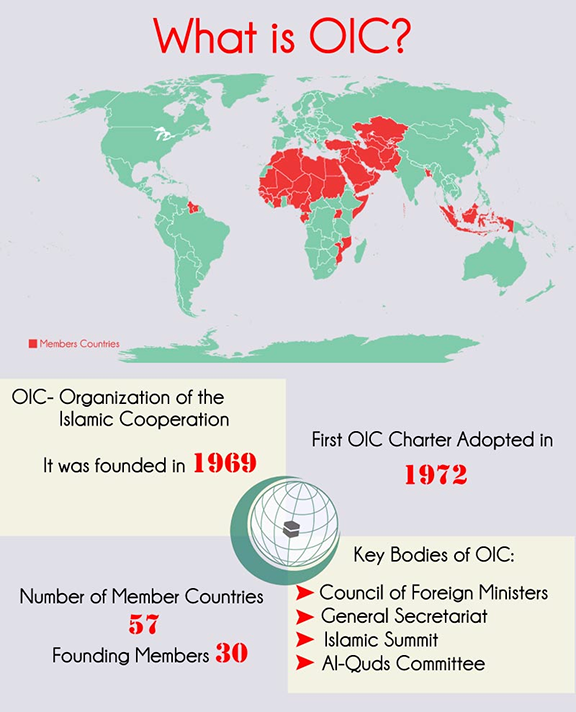Organisation of the Islamic Cooperation & India | 17 Feb 2022
For Prelims: Organisation of Islamic Cooperation (OIC), UN Human Rights Council,
For Mains: Effect of Policies & Politics of Countries on India's Interests, India’s relationship with OIC as an organisation
Why in the News?
Recently, India has lashed out at the Organisation of the Islamic Cooperation (OIC) for being "communal minded" amid the Karnataka hijab row.
What is the recent Controversy Between OIC & India?
- OIC Statement: The OIC has called on the UN Human Rights Council to take “necessary measures” on the issue of Muslim girl students being told not to wear the hijab in Karnataka schools.
- The OIC also urged India to “ensure the safety, security and well being of the Muslim community while protecting their way of life”.
- India's Response: India held that it is a democracy, and issues within the country are resolved in accordance with our Constitutional framework and mechanism, as well as democratic ethos and polity.
- Further, India criticised OIC for being “communal minded” and “hijacked by vested interests” – a thinly veiled reference to Pakistan.
What is the Organisation of Islamic Cooperation?
- About:
- The OIC is the second largest intergovernmental organisation after the United Nations with a membership of 57 states.
- It is the collective voice of the Muslim world.
- It endeavors to safeguard and protect the interests of the Muslim world in the spirit of promoting international peace and harmony among various people of the world.
- The Organisation of the Islamic Conference was established by the First Islamic Summit Conference held in Morocco in September 1969, to marshal the Islamic world after an act of arson at the Al-Aqsa Mosque in Jersualem by a 28-year-old Australian in 1969.
- Headquarters: Jeddah, Saudi Arabia.
What is the Status of India’s relationship with OIC as an organisation?
- As a country with the world’s second largest Muslim community, India had been invited to the founding conference at Rabat in 1969, but was humiliatingly ejected at Pakistan’s behest.
- India stayed away because of a multiplicity of reasons:
- It did not want to join an organisation founded on religion.
- There was the risk that improving bilateral relations with individual member states would come under pressure in a grouping, especially on issues such as Kashmir.
- At the 45th session of the Foreign Ministers’ Summit in 2018, Bangladesh, the host, suggested that India, where more than 10% of the world’s Muslims live, should be given Observer status, but Pakistan opposed the proposal.
- After building close ties with powerful members such as UAE and Saudi Arabia, India has been confident of riding over any statement by the grouping.
- India has consistently underlined that J&K is an “integral part of India and is a matter strictly internal to India”, and that the OIC has no locus standi on the issue.
- In 2019, India made its maiden appearance at the OIC Foreign Ministers’ meeting, as a “guest of honour”.
- This first-time invitation was seen as a diplomatic victory for India, especially at a time of heightened tensions with Pakistan following the Pulwama attack.

